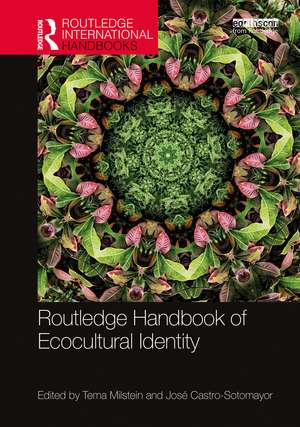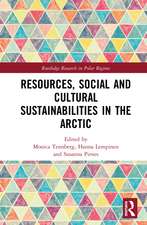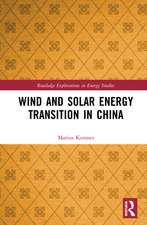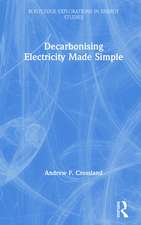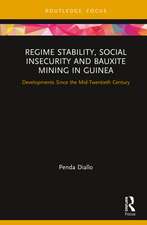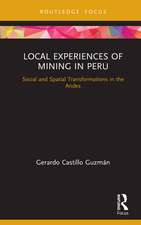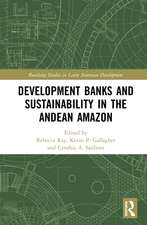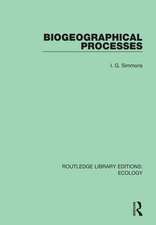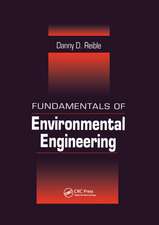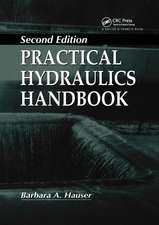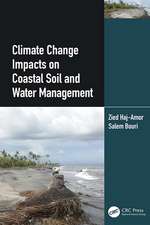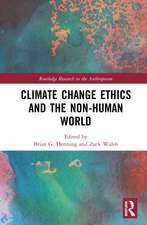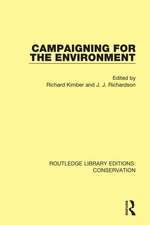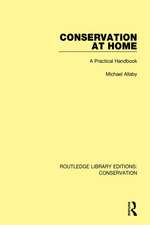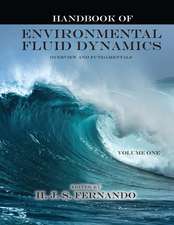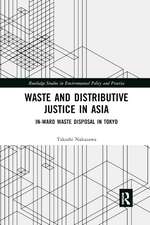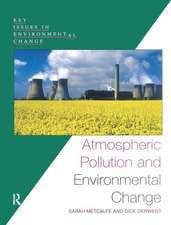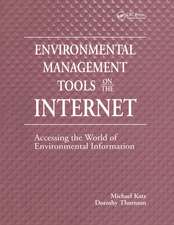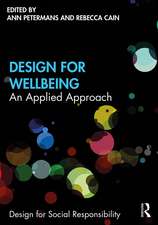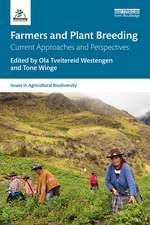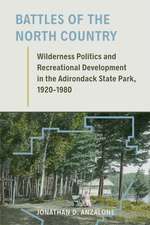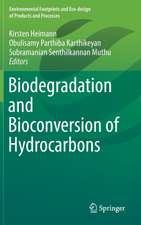Routledge Handbook of Ecocultural Identity: Routledge Environment and Sustainability Handbooks
Editat de Tema Milstein, José Castro-Sotomayoren Limba Engleză Hardback – 14 mai 2020
Part I illuminates identity as always ecocultural, expanding dominant understandings of who we are and how our ways of identifying engender earthly outcomes.
Part II examines ways ecocultural identities are fostered and how difference and spaces of interaction can be sources of environmental conviviality.
Part III illustrates consequential ways the media sphere informs, challenges, and amplifies particular ecocultural identities.
Part IV delves into the constitutive power of ecocultural identities and illuminates ways ecological forces shape the political sphere.
Part V demonstrates multiple and unspooling ways in which ecocultural identities can evolve and transform to recall ways forward to reciprocal surviving and thriving.
The Routledge Handbook of Ecocultural Identity provides an essential resource for scholars, teachers, students, protectors, and practitioners interested in ecological and sociocultural regeneration.
The Routledge Handbook of Ecocultural Identity has been awarded the 2020 Book Award from the National Communication Association's (USA) Environmental Communication Division.
| Toate formatele și edițiile | Preț | Express |
|---|---|---|
| Paperback (1) | 433.58 lei 6-8 săpt. | |
| Taylor & Francis – 13 iun 2022 | 433.58 lei 6-8 săpt. | |
| Hardback (1) | 1565.66 lei 6-8 săpt. | |
| Taylor & Francis – 14 mai 2020 | 1565.66 lei 6-8 săpt. |
Din seria Routledge Environment and Sustainability Handbooks
- 8%
 Preț: 446.50 lei
Preț: 446.50 lei -
 Preț: 344.05 lei
Preț: 344.05 lei -
 Preț: 345.96 lei
Preț: 345.96 lei -
 Preț: 375.80 lei
Preț: 375.80 lei -
 Preț: 341.55 lei
Preț: 341.55 lei -
 Preț: 332.04 lei
Preț: 332.04 lei - 15%
 Preț: 427.16 lei
Preț: 427.16 lei -
 Preț: 363.04 lei
Preț: 363.04 lei - 9%
 Preț: 1349.76 lei
Preț: 1349.76 lei - 8%
 Preț: 445.41 lei
Preț: 445.41 lei - 26%
 Preț: 1359.11 lei
Preț: 1359.11 lei - 25%
 Preț: 1223.03 lei
Preț: 1223.03 lei -
 Preț: 449.41 lei
Preț: 449.41 lei - 15%
 Preț: 441.09 lei
Preț: 441.09 lei - 22%
 Preț: 352.95 lei
Preț: 352.95 lei - 25%
 Preț: 1228.29 lei
Preț: 1228.29 lei - 26%
 Preț: 1218.32 lei
Preț: 1218.32 lei - 26%
 Preț: 1189.60 lei
Preț: 1189.60 lei -
 Preț: 460.58 lei
Preț: 460.58 lei - 25%
 Preț: 1192.62 lei
Preț: 1192.62 lei - 11%
 Preț: 309.28 lei
Preț: 309.28 lei - 15%
 Preț: 480.51 lei
Preț: 480.51 lei - 26%
 Preț: 1187.85 lei
Preț: 1187.85 lei - 15%
 Preț: 509.71 lei
Preț: 509.71 lei - 23%
 Preț: 410.54 lei
Preț: 410.54 lei - 26%
 Preț: 1356.60 lei
Preț: 1356.60 lei - 25%
 Preț: 1221.45 lei
Preț: 1221.45 lei - 18%
 Preț: 1558.26 lei
Preț: 1558.26 lei - 25%
 Preț: 1218.92 lei
Preț: 1218.92 lei - 11%
 Preț: 350.19 lei
Preț: 350.19 lei - 25%
 Preț: 1260.99 lei
Preț: 1260.99 lei - 18%
 Preț: 1563.17 lei
Preț: 1563.17 lei - 26%
 Preț: 1188.43 lei
Preț: 1188.43 lei -
 Preț: 356.63 lei
Preț: 356.63 lei - 25%
 Preț: 1220.17 lei
Preț: 1220.17 lei - 15%
 Preț: 507.27 lei
Preț: 507.27 lei
Preț: 1565.66 lei
Preț vechi: 1909.34 lei
-18% Nou
Puncte Express: 2348
Preț estimativ în valută:
299.67€ • 311.67$ • 251.12£
299.67€ • 311.67$ • 251.12£
Carte tipărită la comandă
Livrare economică 13-27 martie
Preluare comenzi: 021 569.72.76
Specificații
ISBN-13: 9781138478411
ISBN-10: 1138478415
Pagini: 522
Ilustrații: 26
Dimensiuni: 174 x 246 x 29 mm
Greutate: 1.05 kg
Ediția:1
Editura: Taylor & Francis
Colecția Routledge
Seria Routledge Environment and Sustainability Handbooks
Locul publicării:Oxford, United Kingdom
ISBN-10: 1138478415
Pagini: 522
Ilustrații: 26
Dimensiuni: 174 x 246 x 29 mm
Greutate: 1.05 kg
Ediția:1
Editura: Taylor & Francis
Colecția Routledge
Seria Routledge Environment and Sustainability Handbooks
Locul publicării:Oxford, United Kingdom
Public țintă
Postgraduate and UndergraduateCuprins
Ecocultural Identity: An IntroductionTema Milstein, José Castro-Sotomayor
Part I. Illuminating and Problematizing Ecocultural Identity
Chapter 1. Interbreathing Ecocultural Identity in the Humilocene
David Abram with Tema Milstein and José Castro-Sotomayor
Chapter 2. Ecocultural Identity Boundary Patrol and Transgression
Tema Milstein
Chapter 3. Borderland Ecocultural Identities
Carlos A. Tarin, Sarah D. Upton, Stacey K. Sowards
Chapter 4. Ecocultural Identities in Intercultural Encounters
José Castro-Sotomayor
Chapter 5. Western Dominator Ecocultural Identity and the Denial of Animal Autonomy
Laura Bridgeman
Chapter 6. Critical Ecocultural Intersectionality
Melissa Michelle Parks
Part II. Forming and Fostering Ecocultural Identity
Chapter 7. Intersectional Ecocultural Identity in Family Stories
Mariko Thomas
Chapter 8. Interspecies Ecocultural Identities in Human-Elephant Cohabitation
Elizabeth Oriel, Toni Frohoff
Chapter 9. Memory, Waterways, and Ecocultural Identity
Jeffrey Alan Hoffmann
Chapter 10. "Progressive Ranching" and Wrangling the Wind as Ecocultural Identity Maintenance in the Anthropocene
Casper G. Bendixsen, Trevor J. Durbin, Jakob Hanschu
Chapter 11. Constructing and Challenging Ecocultural Identity Boundaries among Sportsmen
Jessica Love-Nichols
Chapter 12. The Reworking of Evangelical Christian Ecocultural Identity in the Creation Care Movement
Emma Frances Bloomfield
Chapter 13. Navigating Ecocultural Indigenous Identity Affinity and Appropriation
Charles Carlin
Part III. Mediating Ecocultural Identity
Chapter 14. Identifying with Antarctica in the Ecocultural Imaginary
Hanne Nielsen
Chapter 15. Illegal Mining, Identity, and the Politics of Ecocultural Voice in Ghana
Eric Karikari, José Castro-Sotomayor, Godfried Asante
Chapter 16. Conservation Hero and Climate Villain Binary Identities of Swedish Farmers
Lars Hallgren, Hanna Ljunggren Bergeå, Helena Nordström Källström
Chapter 17. Modeling Watershed Ecocultural Identification and Subjectivity in the United States.
Jeremy Trombley
Part IV. Politicizing Ecocultural Identity
Chapter 18. Induced Seismicity, Quotidian Disruption, and Challenges to Extractivist Ecocultural Identity
Dakota K. T. Raynes, Tamara L. Mix
Chapter 19. Political Identity as Ecocultural Survival Strategy
John Carr, Tema Milstein
Chapter 20. The Making of Fluid Ecocultural Identities in Urban India
Shilpa Dahake
Chapter 21. Competing Models of Ecocultural Belonging in Highland Ecuador
Joe Quick, James T. Spartz
Chapter 22. Scapegoating Identities in the Anthropocene
Leonie Tuitjer
Part V. Transforming Ecocultural Identity
Chapter 23. A Queer Ecological Reading of Ecocultural Identity in Contemporary Mexico
Gabriela Méndez Cota
Chapter 24. Wildtending, Settler Colonialism, and Ecocultural Identities in Environmental Futures
Bruno Seraphin
Chapter 25. Toward a Grammar of Ecocultural Identity
Arran Stibbe
Chapter 26. Perceiving Ecocultural Identities as Human Animal Earthlings
Carrie P. Freeman
Chapter 27. Fostering Children’s Ecocultural Identities within Ecoresiliency
Shannon Audley, Ninian R. Stein, Julia L. Ginsburg
Chapter 28. Empathetic Ecocultural Positionality and the Forest Other in Tasmanian Forestry Conflicts
Rebecca Banham
Afterword. Surviving and Thriving: The Ecocultural Identity Invitation
Tema Milstein, José Castro-Sotomayor
Index
Part I. Illuminating and Problematizing Ecocultural Identity
Chapter 1. Interbreathing Ecocultural Identity in the Humilocene
David Abram with Tema Milstein and José Castro-Sotomayor
Chapter 2. Ecocultural Identity Boundary Patrol and Transgression
Tema Milstein
Chapter 3. Borderland Ecocultural Identities
Carlos A. Tarin, Sarah D. Upton, Stacey K. Sowards
Chapter 4. Ecocultural Identities in Intercultural Encounters
José Castro-Sotomayor
Chapter 5. Western Dominator Ecocultural Identity and the Denial of Animal Autonomy
Laura Bridgeman
Chapter 6. Critical Ecocultural Intersectionality
Melissa Michelle Parks
Part II. Forming and Fostering Ecocultural Identity
Chapter 7. Intersectional Ecocultural Identity in Family Stories
Mariko Thomas
Chapter 8. Interspecies Ecocultural Identities in Human-Elephant Cohabitation
Elizabeth Oriel, Toni Frohoff
Chapter 9. Memory, Waterways, and Ecocultural Identity
Jeffrey Alan Hoffmann
Chapter 10. "Progressive Ranching" and Wrangling the Wind as Ecocultural Identity Maintenance in the Anthropocene
Casper G. Bendixsen, Trevor J. Durbin, Jakob Hanschu
Chapter 11. Constructing and Challenging Ecocultural Identity Boundaries among Sportsmen
Jessica Love-Nichols
Chapter 12. The Reworking of Evangelical Christian Ecocultural Identity in the Creation Care Movement
Emma Frances Bloomfield
Chapter 13. Navigating Ecocultural Indigenous Identity Affinity and Appropriation
Charles Carlin
Part III. Mediating Ecocultural Identity
Chapter 14. Identifying with Antarctica in the Ecocultural Imaginary
Hanne Nielsen
Chapter 15. Illegal Mining, Identity, and the Politics of Ecocultural Voice in Ghana
Eric Karikari, José Castro-Sotomayor, Godfried Asante
Chapter 16. Conservation Hero and Climate Villain Binary Identities of Swedish Farmers
Lars Hallgren, Hanna Ljunggren Bergeå, Helena Nordström Källström
Chapter 17. Modeling Watershed Ecocultural Identification and Subjectivity in the United States.
Jeremy Trombley
Part IV. Politicizing Ecocultural Identity
Chapter 18. Induced Seismicity, Quotidian Disruption, and Challenges to Extractivist Ecocultural Identity
Dakota K. T. Raynes, Tamara L. Mix
Chapter 19. Political Identity as Ecocultural Survival Strategy
John Carr, Tema Milstein
Chapter 20. The Making of Fluid Ecocultural Identities in Urban India
Shilpa Dahake
Chapter 21. Competing Models of Ecocultural Belonging in Highland Ecuador
Joe Quick, James T. Spartz
Chapter 22. Scapegoating Identities in the Anthropocene
Leonie Tuitjer
Part V. Transforming Ecocultural Identity
Chapter 23. A Queer Ecological Reading of Ecocultural Identity in Contemporary Mexico
Gabriela Méndez Cota
Chapter 24. Wildtending, Settler Colonialism, and Ecocultural Identities in Environmental Futures
Bruno Seraphin
Chapter 25. Toward a Grammar of Ecocultural Identity
Arran Stibbe
Chapter 26. Perceiving Ecocultural Identities as Human Animal Earthlings
Carrie P. Freeman
Chapter 27. Fostering Children’s Ecocultural Identities within Ecoresiliency
Shannon Audley, Ninian R. Stein, Julia L. Ginsburg
Chapter 28. Empathetic Ecocultural Positionality and the Forest Other in Tasmanian Forestry Conflicts
Rebecca Banham
Afterword. Surviving and Thriving: The Ecocultural Identity Invitation
Tema Milstein, José Castro-Sotomayor
Index
Notă biografică
Tema Milstein is an Associate Professor of Environment & Society at the University of New South Wales, Australia. Her work tends to ways culture, society, and discourse inform – and are informed by – earthly relations.
José Castro-Sotomayor is an Assistant Professor at California State University Channel Islands, USA. His work investigates environmental and intercultural dynamics of human and more-than-human communication, agency, and dissent.
José Castro-Sotomayor is an Assistant Professor at California State University Channel Islands, USA. His work investigates environmental and intercultural dynamics of human and more-than-human communication, agency, and dissent.
Recenzii
“Intricately transdisciplinary and cross-geographical, it is the first volume of its kind to caringly craft a gathering concept, that of ecocultural identities, bringing together the social, political, and ecological dimensions of identity. What results is a treasure of insights on the politics of life, broadly speaking, and a novel toolbox for tackling effectively the damages caused by modern capitalist modes of extraction and the urgent task of Earth’s ontological repair and renewal.”
Arturo Escobar, University of North Carolina, Chapel Hill
“Too often mislabelled an ‘issue,’ the environment is in fact integral not just to everything we do but to who we are. This link between our identity and our ecology has long been recognised in many societies, but others seem to have forgotten its signal importance. This superb collection shows why all identities are ecocultural ones, and why full recognition of this is essential to all our political futures.”
Noel Castree, University of Manchester
“A smart, provocative, and original collection, the Handbook of Ecocultural Identity provides a definitive introduction to the constraints upon, and the contexts, formations, and impacts of, our diverse – but often unexamined – ecological selves.”
Robert Cox, University of North Carolina, Chapel Hill, and three-time national president of the Sierra Club
“The Handbook of Ecocultural Identity is an urgent call to the prevailing identity discussion. Amplifying the voiceless could – and should – encompass our environment, and not just the humans in it. If we can’t recognise the value of the ecosystem which makes life possible, there’s slim chance we’ll remember to see the value in each other.”
Ayishat Akanbi, cultural commentator and writer, United Kingdom
“If diversity is a crucial condition for healthy cultural and ecological affairs, it is also so in scholarly matters, and that is what readers will find in this excellent Handbook – a variety of ways of keeping our social and ecological worlds mutually articulated, healthily together.”
Donal Carbaugh, University of Massachusetts
“I am in complete solidarity with this book.”
Donna Haraway, University of California, Santa Cruz
“Some of the most transformative scholarship occurs when we don’t simply critique the limits of existing approaches, but courageously throw in front of us new conceptual approaches or orientations, often marked in the first instance by new words. It is in this vein that the Handbook of Ecocultural Identity runs, offering up and then beginning to give form, colour, and texture to the term “ecocultural identity” as a way to think beyond a range of dichotomies that have constituted and normalized human exceptionalism and our violent estrangement from the eco-worlds in which we are embedded. In a spirit of humility and generosity, the editors do not try to fix this new term in the net of their own interpretations, but rather create a rich interdisciplinary and global forum where the chapter authors are welcomed to articulate their understandings of what ecocultural identity means, and what this term might do to how we might think and act. Readers too are invited to join the conversation in what promises to be a fertile approach to thinking and acting with appropriate humility in an era that is crying out for humans to come home to themselves as ecocultural beings.”
Danielle Celermajer, University of Sydney
“The chapters in this Handbook lay the groundwork for a radical revisioning of human relations with/in the more-than-human world. The Handbook provides needed strategies for ecological resilience in the midst of the Anthropocene and for imagining our collective future.”
Danielle Endres, University of Utah
“As we find ourselves faced with the extreme environmental consequences of the Anthropocene, we need guides to help us negotiate appropriate ways of living with and understanding our relationship to the more-than-human world. This Handbook offers to the field a significant theoretical contribution, ecocultural identity, providing a practical and necessary guide for comprehending our inseparable place in the ecological web of life.”
Barb Willard, DePaul University
Arturo Escobar, University of North Carolina, Chapel Hill
“Too often mislabelled an ‘issue,’ the environment is in fact integral not just to everything we do but to who we are. This link between our identity and our ecology has long been recognised in many societies, but others seem to have forgotten its signal importance. This superb collection shows why all identities are ecocultural ones, and why full recognition of this is essential to all our political futures.”
Noel Castree, University of Manchester
“A smart, provocative, and original collection, the Handbook of Ecocultural Identity provides a definitive introduction to the constraints upon, and the contexts, formations, and impacts of, our diverse – but often unexamined – ecological selves.”
Robert Cox, University of North Carolina, Chapel Hill, and three-time national president of the Sierra Club
“The Handbook of Ecocultural Identity is an urgent call to the prevailing identity discussion. Amplifying the voiceless could – and should – encompass our environment, and not just the humans in it. If we can’t recognise the value of the ecosystem which makes life possible, there’s slim chance we’ll remember to see the value in each other.”
Ayishat Akanbi, cultural commentator and writer, United Kingdom
“If diversity is a crucial condition for healthy cultural and ecological affairs, it is also so in scholarly matters, and that is what readers will find in this excellent Handbook – a variety of ways of keeping our social and ecological worlds mutually articulated, healthily together.”
Donal Carbaugh, University of Massachusetts
“I am in complete solidarity with this book.”
Donna Haraway, University of California, Santa Cruz
“Some of the most transformative scholarship occurs when we don’t simply critique the limits of existing approaches, but courageously throw in front of us new conceptual approaches or orientations, often marked in the first instance by new words. It is in this vein that the Handbook of Ecocultural Identity runs, offering up and then beginning to give form, colour, and texture to the term “ecocultural identity” as a way to think beyond a range of dichotomies that have constituted and normalized human exceptionalism and our violent estrangement from the eco-worlds in which we are embedded. In a spirit of humility and generosity, the editors do not try to fix this new term in the net of their own interpretations, but rather create a rich interdisciplinary and global forum where the chapter authors are welcomed to articulate their understandings of what ecocultural identity means, and what this term might do to how we might think and act. Readers too are invited to join the conversation in what promises to be a fertile approach to thinking and acting with appropriate humility in an era that is crying out for humans to come home to themselves as ecocultural beings.”
Danielle Celermajer, University of Sydney
“The chapters in this Handbook lay the groundwork for a radical revisioning of human relations with/in the more-than-human world. The Handbook provides needed strategies for ecological resilience in the midst of the Anthropocene and for imagining our collective future.”
Danielle Endres, University of Utah
“As we find ourselves faced with the extreme environmental consequences of the Anthropocene, we need guides to help us negotiate appropriate ways of living with and understanding our relationship to the more-than-human world. This Handbook offers to the field a significant theoretical contribution, ecocultural identity, providing a practical and necessary guide for comprehending our inseparable place in the ecological web of life.”
Barb Willard, DePaul University
Descriere
Providing a transdisciplinary overview of this cutting-edge subject, this Handbook will be an essential resource for students and scholars of environmental communication, environmental sociology, human geography and environmental studies more broadly.
